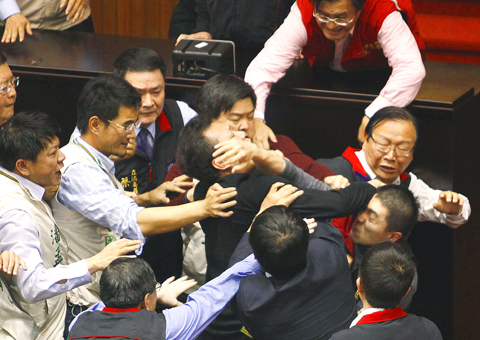|
Legislative session plunges into chaos
WHEN WORDS FAIL: Unable to prevent a controversial
amendment to the Local Government Act, the DPP said it would seek input from the
Council of Grand Justices
By Flora Wang and Jenny W. Hsu
STAFF REPORTERS
Tuesday, Jan 19, 2010, Page 1

Democratic Progressive Party and Chinese
Nationalist Party (KMT) legislators scuffle during a session at the Legislative
Yuan in Taipei yesterday.
PHOTO: NICKY LOH, REUTERS
Amid fistfights, yelling, shouting and pushing, the Chinese
Nationalist Party (KMT) legislative caucus pushed through a disputed amendment
to the Local Government Act (地方制度法) during a hastily arranged extra legislative
session yesterday, allowing township heads of five special municipalities to
become district directors after the municipalities are formed.
The KMT mobilized its legislators to escort Vice Legislative Speaker Tseng
Yung-chuan (曾永權) to the speaker’s podium as Democratic Progressive Party (DPP)
legislators blocked Speaker Wang Jin-pyng (王金平) from entering the building from
the doors behind the podium.
Tseng, who was heavily guarded by KMT lawmakers, managed to announce that each
article of the bill would be put to a vote as DPP legislators tried to pull him
away or snatch his notes and the microphone.
As Tseng was presiding over the session, DPP legislators Liu Chien-kuo (劉建國) and
Pan Meng-an (潘孟安) got into a scuffle with their KMT counterparts.
Other DPP legislators shouted “the KMT is a disgrace,” “oppose” and “thieves” as
legislative staff tried to read through the bill.
The KMT, which holds 73 of the 113 legislative seats, managed to win the votes
on every article of the bill while DPP legislators were occupied with launching
protests on the legislative floor.
Under the amendment, only township chiefs who have served two terms or have been
convicted of treason, tax evasion or corruption will be disqualified from being
appointed by mayors of the special municipalities as district heads. The
township mayor-turned-district heads will complete their term of office
simultaneously when the mayors of the five special municipalities complete
theirs.
This means that the current township heads of the special municipalities-to-be
will be able to serve as public officials through at least 2014 — nine years
after they were elected in 2005.
The DPP has called the bill “unconstitutional” as it would deprive mayors of
special municipalities of their power to appoint district heads.
The legislature also voted in favor of allowing incumbent township councilors to
serve as unpaid advisers to the district directors, but they are entitled to a
stipend for attending meetings.
The KMT previously proposed putting these councilors on government payrolls, but
revised the bill after being accused of trying to buy support with the proposal
for the KMT’s candidates in the year-end special municipality mayoral elections.
In accordance with the amendment, the number of councilors of special
municipalities that have a population exceeding 2 million will be capped at 62,
up from 52 in the current regulations.
Some of the seats should be reserved for Aborigines if the municipalities have a
plains Aboriginal population of more than 2,000, the amendment says, but does
not specify the number of seats. Mayors of special municipalities with a
population of more than 2.5 million can appoint three deputy mayors, down from
two, the amendment stipulates.
After the bill cleared the legislative floor, the KMT caucus condemned the DPP
for “resorting to violence” to paralyze the session.
KMT caucus whip Lin Yi-shih (林益世) and secretary-general Lu Hsueh-chang (呂學樟)
accused DPP Chairperson Tsai Ing-wen (蔡英文) of encouraging DPP legislators to use
violence.
Lin urged Tsai to apologize to the public over the DPP’s boycott of the session,
adding that many members of the caucus were injured during the clash.
In addition to the ructions inside the legislature, several groups protested
outside.
Members of the Aboriginal community said the amendment would hurt their heritage
because at least five Aboriginal townships would be urbanized if it passes.
“We call on President Ma Ying-jeou (馬英九) to respect our right to
self-determination. We have been asking for an autonomous region for several
years now, but our requests have consistently been ignored. Enough is enough,”
said Omi Wilang, an Atayal pastor and Aboriginal rights activist.
Wilang said that according to the law, all district heads will be appointed by
the municipal chief. It is very unlike that the political appointees will care
about Aboriginal affairs or be a tribal member, he said, stressing the
importance of setting up an autonomous region.
Township representatives also opposed to the amendment saying appointing people
as district advisors was anti-democratic and the positions should be filled
through elections.
“We are here to protect Taiwan’s democracy. Both the DPP and the KMT will
destroy the system by passing the amendment,” one of the demonstrators said.
Several protestors burned their KMT membership cards.
In a statement, the DPP said approval of the amendment was tantamount to the
legislature appointing chiefs of districts directly, which thoroughly breaks the
principle of local government autonomy.
The DPP said the party had done what it could to prevent this from happening,
adding that Ma should shoulder responsibility for the passage of a “bad bill.”
The DPP caucus said it would request a constitutional interpretation.
|
![]()
![]()
![]()